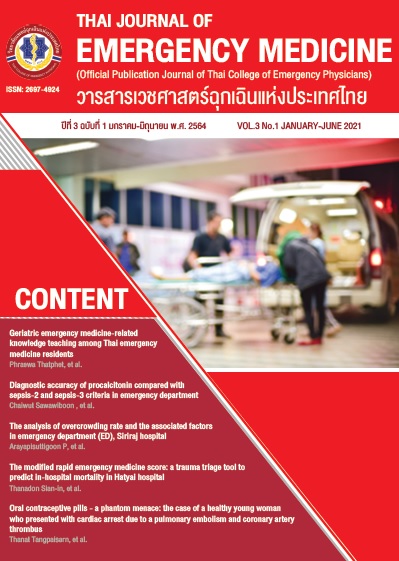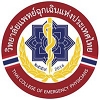Geriatric emergency medicine-related knowledge teaching among Thai emergency medicine residents
Keywords:
Geriatric emergency medicine, Emergency medicine resident, ThailandAbstract
Introduction : The number of the older adult population and the geriatric patients seeking emergency has been increasing. The emergency department (ED) is affected by this growing number. Emergency physicians (EPs) are prepared to take care of patients in the ED. Unfortunately, some physicians still unfamiliar with taking care of older adult patients. Emergency medicine (EM) in Thailand was established in 2003 but yet, there is no specific topic about geriatric emergency medicine in the current EM residency curriculum.
Objective : This study aims to explore how GEM knowledge is taught in the Thai EM residency curriculum and the barriers to teaching GEM.
Study design : We developed a web-based survey. We gathered the list of EM residency training institutions, contacted 22 training sites, and sent out the email with the survey link to the EM department or EM residency program director. Descriptive analysis was performed.
Result : We had a 64% (14/22) response rate. Seven institutions were teaching GEM. The mean time spent on teaching GEM-related knowledge was 4 hours (SD+2.8). Two (28.6%) institutions had GEM staff. No GEM specialist staff was the main barrier to teaching GEM-related knowledge. Most (92.9%) thought providing GEM course for EM staffs will enhance teaching GEM-related topics to EM residents. All participants thought that GEM-related knowledge is important to EP and thought an online course could enhance GEM-related knowledge.
Conclusion : Despite unanimous opinions that GEM-related knowledge is important to EM residents, teaching GEM-related knowledge is still a novelty in the Thai EM residency curriculum. The major barrier was a lack of GEM specialists which might be solved by creating a GEM course for EM staff with setting up a standard course and a regular online course for the residents. Evaluation after the course and adding GEM-related knowledge in board examination might enhance interested in the GEM-related knowledge.
References
Hwang U, Morrison RS. The Geriatric Emergency Department: THE GERIATRIC EMERGENCY DEPARTMENT. J Am Geriatr Soc. 2007 Nov;55(11):1873–6. https://doi.org/10.1111/j.1532-5415.2007.01400.x
United Nations, Department of Economic and Social Affairs, Population Division. World population ageing 2020 Highlights: living arrangements of older persons [Internet]. 2020. [cited 2021 Jan 15] Available from: https://www.un.org/development/desa/pd/sites/www.un.org.development.desa.pd/files/undesa_pd-2020_world_population_ageing_highlights.pdf
George G. Effect of population ageing on emergency department speed and efficiency: a historical perspective from a district general hospital in the UK. Emer Med J. 2006 May 1;23(5):379–83. http://doi.org/10.1136/emj.2005.029793
Schumacher JG, Deimling GT, Meldon S, Woolard B. Older adults in the emergency department: Predicting physicians’ burden levels. The Journal of Emergency Medicine. 2006 May;30(4):455–60. http://doi.org/10.1016/j.jemermed.2005.07.008
Ashman JJ. Emergency Department Visits Among Adults Aged 60 and Over: United States [Internet], 2014–2017. 2020;(367):8.) [cited 2021 Jan 15] Available from: https://www.cdc.gov/nchs/data/databriefs/db367-h.pdf
Wilber ST, Gerson LW, Terrell KM, Carpenter CR, Shah MN, Heard K, et al. Geriatric Emergency Medicine and the 2006 Institute of Medicine Reports from the Committee on the Future of Emergency Care in the U.S. Health System. Acad Emerg Med. 2006 Dec;13(12):1345–51. http://doi.org/10.1197/j.aem.2006.09.050
Knodel J, Prachuabmoh V, Chayovan N. The Changing Well-being of Thai Elderly
An update from the 2011 Survey of Older Persons in Thailand: HelpAge International East Asia/Pacific Regional Office. [Internet]; 2013. [cited 2021 Jan 15] Available from: https://www.helpage.org/silo/files/the-changing-wellbeing-of-thai-elderly-an-update-from-the-2011-survey-of-older-persons-in-thailand.pdf
Department of Economic and Social Affairs. World Population Prospects The 2010 Revision Volume I: Comprehensive Tables[Internet]. United Nations; 2011 [cited 2021 Jan 15] Available from: https://www.un.org/en/development/desa/population/publications/pdf/trends/WPP2010/WPP2010_Volume-I_Comprehensive-Tables.pdf
Geriatric medicine: a problem-based approach. New York, NY: Springer Berlin Heidelberg; 2017.
Salvi F, Morichi V, Grilli A, Giorgi R, Tommaso GD, Dessì-Fulgheri P. The elderly in the emergency department: a critical review of problems and solutions. Intern Emerg Med. (2007) 2:292-301. http://doi.org/10.1007/s11739-007-0081-3
Hogan TM, Chan SB, Hansoti B. Multidimensional Attitudes of Emergency Medicine Residents Toward Older Adults. WestJEM. 2014 Jul 7;15(4):511–7. http://doi.org/10.5811/westjem.2014.2.19937
Li Y, Wang S, Li J, Dong B-R, Li Z-X, Yu J-M, et al. A survey of physicians who care for older persons in Southwest China. J Nutr Health Aging. 2013 Feb;17(2):192–5. http://doi.org/10.1007/s12603-012-0086-0
Carpenter CR, Lewis LM, Caterino JM, Wilber ST, Scheatzle MD, Fiorello AB. 375: Emergency Physician Geriatric Education: An Update of the 1992 Geriatric Task Force Survey. Has Anything Changed? Ann of Emerg Med. 2008 Oct;52(4):S156. http://doi.org/10.1016/j.annemergmed.2008.06.402
Rathore SS, Mehta RH, Wang Y, Radford MJ, Krumholz HM. Effects of age on the quality of care provided to older patients with acute myocardial infarction. Am J Med. 2003 Mar;114(4):307–15. http://doi.org/10.1016/S0002-9343(02)01531-0
Magid DJ, Masoudi FA, Vinson DR, van der Vlugt TM, Padgett TG, Tricomi AJ, et al. Older Emergency Department Patients With Acute Myocardial Infarction Receive Lower Quality of Care Than Younger Patients. Ann Emerg Med. 2005 Jul;46(1):14–21. http://doi.org/10.1016/j.annemergmed.2004.12.012
1. McNamara RM, Rousseau E, Sanders AB. Geriatric emergency medicine: A survey of practicing emergency physicians. Ann Emerg Med. 1992 Jul;21(7):796–801. http://doi.org/10.1016/S0196-0644(05)81024-8
Drickamer MA, Levy B, Irwin KS, Rohrbaugh RM. Perceived needs for geriatric education by medical students, internal medicine residents and faculty. J Gen Intern Med. 2006 Dec;21(12):1230–4. http://doi.org/10.1111/j.1525-1497.2006.00585.x
Jones JS, Rousseau EW, Schropp MA, Sanders AB. Geriatric training in emergency medicine residency programs. Ann Emerg Med. 1992 Jul;21(7):825–9. http://doi/org/10.1016/S0196-0644(05)81029-7
Jones J, Dougherty J, Cannon L, Schelble D. A geriatrics curriculum for emergency medicine training programs. Annals of Emergency Medicine. 1986 Nov;15(11):1275–81. htto://doi.org/10.1016/S0196-0644(86)80608-4
Witzke DB, Sanders AB, for the SAEM Geriatric Emergency Medicine Task Force*. The Development and Evaluation of a Geriatric Emergency Medicine Curriculum. Acad Emerg Med. 1997 Mar;4(3):219–22. http://doi.org/10.1111/j.1553-2712.1997.tb03745.x
Prendergast HM, Jurivich D, Edison M, Bunney EB, Williams J, Schlichting A. Preparing the Front Line for the Increase in the Aging Population: Geriatric Curriculum Development for an Emergency Medicine Residency Program. J Emerg Med. 2010 Apr;38(3):386–92. http://doi.org/10.1016/j.jemermed.2008.05.003
Biese KJ, Roberts E, LaMantia M, Zamora Z, Shofer FS, Snyder G, et al. Effect of a Geriatric Curriculum on Emergency Medicine Resident Attitudes, Knowledge, and Decision-making: EFFECT OF A GERIATRIC CURRICULUM ON EMERGENCY MEDICINE RESIDENTS. Acad Emerg Med. 2011 Oct;18:S92–6. http://doi.org/10.1111/j.1553-2712.2011.01170.x
Wadman M, Lyons W, Hoffman L, Muelleman R. Assessment of a Chief Complaint-Based Curriculum for Resident Education in Geriatric Emergency Medicine. WestJEM. 2011;12(4):484–8. http://doi.org/10.5811/westjem.2010.10.1722
Hogan TM, Hansoti B, Chan SB. Assessing Knowledge Base on Geriatric Competencies for Emergency Medicine Residents. WestJEM. 2014 Jul 7;15(4):409–13. http://doi.org/10.5811/westjem.2014.2.18896
Hogan TM, Losman ED, Carpenter CR, Sauvigne K, Irmiter C, Emanuel L, et al. Development of geriatric competencies for emergency medicine residents using an expert consensus process. Acad Emerg Med. 2010 Mar;17(3):316–24. http://doi.org/10.1111/j.1553-2712.2010.00684.x
Sanders AB. Care of the elderly in emergency departments: Conclusions and recommendations. Ann Emerg Med. 1992 Jul;21(7):830–4. http://doi.org/10.1016/S0196-0644(05)81030-3
Pek JH, Lim SH, Ho HF, Ramakrishnan TV, Jamaluddin SF, Mesa-Gaerlan FJC, et al. Emergency medicine as a specialty in Asia: Emergency medicine in Asia. Acute Med Surg. 2016 Apr;3(2):65–73. http://doi.org/10.1002/ams2.154
Iamsanpang S, Sangcharaswichai A. Emergency Medicine. bkkmedj. 2011 Feb 26;01(01):68–70. http://doi.org/10.31524/bkkmedj.2011.02.011
EM training board [Internet]; Thai College of Emergency Physicians. 2019 [update 2019 Sep18; Cited 2020 Oct 21] Available from: https://tcep.or.th
Residency Training in Emergency Medicine [Internet]; Thai College of Emergency Physicians. 2017. [cited 2021 Jan 15] Available from: https://tcep.or.th/sites/default/files/hlaksuutrewchsaastrchukechin_2561.pdf
Mello MJ, Merchant RC, Clark MA. Surveying Emergency Medicine. Cone DC, editor. Acad Emerg Med. 2013 Apr;20(4):409–12. http://doi.org/10.1111/acem.12103
Samaras N, Chevalley T, Samaras D, Gold G. Older Patients in the Emergency Department: A Review. Ann Emerg Med. 2010 Sep;56(3):261–9. http://doi.org/10.1016/j.annemergmed.2010.04.015
Holmboe ES, Iobst WF. Assessment Guidebook. [Internet]; Accreditation Council for Graduate Medical Education (ACGME). 2020 [cited 2021 Jan 15] Available from: https://www.acgme.org/Portals/0/PDFs/Milestones/Guidebooks/AssessmentGuidebook.pdf?ver=2020-11-18-155141-527
Holt KD, Miller RS, Nasca TJ. Residency Programs’ Evaluations of the Competencies: Data Provided to the ACGME About Types of Assessments Used by Programs. J Grad Med Educ. 2010 Dec 1;2(4):649–55. http://doi.org10.4300/JGME-02-04-30
Wu JS, Siewert B, Boiselle PM. Resident Evaluation and Remediation: A Comprehensive Approach. J Grad Med Educ. 2010 Jun 1;2(2):242–5. http://doi.org/10.4300/JGME-D-10-00031.1
Southerland LT, Lo AX, Biese K, Arendts G, Banerjee J, Hwang U, et al. Concepts in Practice: Geriatric Emergency Departments. Annals of Emergency Medicine. 2020 Feb;75(2):162–70. http://doi.org/10.1016/j.annemergmed.2019.08.430
Kahn JH, Magauran B. Trends in Geriatric Emergency Medicine. Emergency Medicine Clinics of North America. 2006 May;24(2):243–60. http://doi.org/10.1016/j.emc.2006.01.012
แพทยสภา. ข้อมูลแพทย์ที่ได้รับหนังสืออนุมัติ-วุฒิบัตรจากแพทยสภา (รายสาขา) [อินเตอร์เน็ต]. กรุงเทพฯ: แพทยสภา; 2563 [เข้าถึงเมื่อ 15 มกราคม 2564]. เข้าถึงได้จาก https://tmc.or.th/pdf/ข้อมูลแพทย์ที่ได้รับหนังสืออนุมัติ-วุฒิบัตรจากแพทยสภา2563.pdf
Freeman BS. The ultimate guide to choosing a medical specialty (Emergency Medicine). New York: McGraw-Hill Medical; 2013.
Samra R, Griffiths A, Cox T, Conroy S, Knight A. Changes in Medical Student and Doctor Attitudes Toward Older Adults After an Intervention: A Systematic Review. J Am Geriatr Soc. 2013 Jul;61(7):1188–96. http://doi.org/10.1111/jgs.12312
Rhew DC. The Effects of an Educational Intervention on Emergency Nurses’ Attitude, Knowledge, and Care Behaviors toward Older Adults. BJSTR [Internet]. 2017 Dec 14 [cited 2021 Jan 27];1(7). Available from: http://biomedres.us/fulltexts/BJSTR.MS.ID.000593.php
Hesselink G, Sir Ö, Öztürk E, Heiwegen N, Olde Rikkert M, Schoon Y. Effects of a geriatric education program for emergency physicians: a mixed-methods study. Health Educ Res. 2020 Jun 1;35(3):216–27. http://doi.org/10.1093/her/cyaa007
Hesselink G, Demirbas M, Rikkert MO, Schoon Y. Geriatric Education Programs for Emergency Department Professionals: A Systematic Review. J Am Geriatr Soc. 2019 Nov;67(11):2402–9. http://doi.org/10.1111/jgs.16067
Perdue C. Falls in older people: taking a multidisciplinary approach. Nurs Times. 2003 Aug 5;99(31):28–30.
Mikolaizak AS, Lord SR, Tiedemann A, Simpson P, Caplan GA, Bendall J, et al. A multidisciplinary intervention to prevent subsequent falls and health service use following fall-related paramedic care: a randomised controlled trial. Age Ageing. 2016 Oct 25;2017(46):200–8. http://doi.org/10.1093/ageing/afw190
Todd P. Semla, John O. Barr, Judith L. Beizer. PHA/AGS Multidisciplinary Competencies in the Care of Older Adults at the Completion of the Entry-Level Health Professional Degree. the Partnership for Health in Aging Workgroup on Multidisciplinary Competencies in Geriatrics. [Internet]. 2010 March [cited 2021 Jan 15];1(7). Available from: https://pogoe.org/sites/default/files/PHA_Multi_Disc_Comps_Final%20Mar%202010.pdf
Cunningham CT, Quan H, Hemmelgarn B, Noseworthy T, Beck CA, Dixon E, et al. Exploring physician specialist response rates to web-based surveys. BMC Med Res Methodol. 2015 Dec;15(1):32. http://doi.org/10.1186/s12874-015-0016-z
Shoham G, Levy-Toledano R, Leong M, Weissman A, Yaron Y, Shoham Z. Oncofertility: insights from IVF specialists—a worldwide web-based survey analysis. J Assist Reprod Genet. 2019 May;36(5):1013–21. http://doi.org/10.1007/s10815-019-01419-8

Downloads
Published
How to Cite
Issue
Section
Categories
License
บทความที่ได้รับตีพิมพ์ในวารสารเวชศาสตร์ฉุกเฉินแห่งประเทศไทย ถือเป็นเป็นลิขสิทธิ์ของ วิทยาลัยแพทย์เวชศาสตร์ฉุกเฉินแห่งประเทศไทย
กรณีที่บทความได้รับการตีพิมพ์ในวารสารเวชศาสตร์ฉุกเฉินแห่งประเทศไทยแล้ว จะตีพิมพ์ในรูปแบบอิเล็กทรอนิกส์ ไม่มีสำเนาการพิมพ์ภายหลังหนังสือเผยแพร่เรียบร้อยแล้ว ผู้นิพนธ์ไม่สามารถนำบทความดังกล่าวไปนำเสนอหรือตีพิมพ์ในรูปแบบใดๆ ที่อื่นได้ หากมิได้รับคำอนุญาตจากวารสารเวชศาสตร์ฉุกเฉินแห่งประเทศไทย



